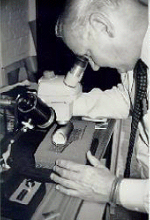Folk Heritage Collections in Crisis
AFC Online Archive of Past Symposia
About the Symposium
In December 2000, the American Folklife
Center and the American Folklore Society convened 100 experts to discuss
the issues of access, preservation, and intellectual property rights of
endangered folklore and ethnographic audio collections. The participants
sought to develop solutions to the many challenges facing recorded-sound
collections across the nation.
The two-day invitational symposium was supported by the National Endowment
for the Arts (NEA), the National Endowment for the Humanities (NEH), The
Council on Library and Information Resources (CLIR), the Recording Industry
Association of America (RIAA), and The GRAMMY Foundation. It brought together
folklorists, preservation specialists, intellectual property lawyers, media
and technology specialists, and librarians and archivists. This diverse
group of professionals worked together to produce action plans, share resources,
and develop guidelines, and many agreed to work on follow-up activities.
 |

Recording engineer John Howell examines
a wax cylinder recording
for damage.
Photo by James Hardin,
Library of Congress. |
|
 |
National Survey
In preparation for the symposium, the American Folklife Center conducted
a survey to assess the crisis level of the nation's ethnographic audio
collections. The survey results were used in the discussions at the symposim.
The survey was sent to all American Folklore Society and Society for Ethnomusicology
members, as well as to a list of known museums, historical societies, universities
and colleges, state arts agencies, and private individuals with collections.
The Center surveyed only collections of original audio recordings,
not commercial recordings or duplicates. We did not include video formats
or photos. A summary of the survey findings are appended to the report: Folk
Heritage Collections in Crisis  available on the CLIR Web site. available on the CLIR Web site.
 |

Per Host (center) tape recording a Chaco
Indian flutist at the home of Gajego (left), a Chaco medicine
man, for the Archive of Folk Culture, 1949. |
|
 |
Why is Heritage Preservation Important?
As Art Silverman, producer of Lost and Found Sound for National Public
Radio and one of our survey respondents said, "You never know how
the future will see the past and the potential for regret is enormous" when
it comes to preserving our nation's heritage of recorded sound.
In 1890, Jesse Walter Fewkes made the first documentary field recordings,
of Passamaquoddy Indians in Maine. Fewkes recognized that the recently
invented Edison wax cylinder recording machine (1877) would allow anthropologists,
ethnomusicologists, folklorists, and others to capture the songs and stories
of the people they interviewed for future generations. Thus began a century
of documentary activity that has resulted in both a bonanza of recorded
sound heritage and the challenge that we have before us today: how to keep
that documentation safe, audible, and available for many more years to
come.
 |

Ethnographer Charles L. Todd records
Mr. and Mrs. Frank Pipkin, 1941. Photo by Robert Hemmig. |
|
 |
The crisis mentioned in the symposium title derives from a growing perception
among folklorists, archivists, and others that the various media used for
field documentation are in serious danger of deterioration due to a variety
of reasons. Even DAT recordings made as recently as five years ago are
at risk.
With the Folk Heritage Collections in Crisis Symposium, and the Save
Our Sounds preservation project, in conjunction with the Smithsonian
Institution, the American Folklife Center has launched a major effort
to preserve the collections in the Archive of Folk Culture for future
generations, and to bring national attention to the "crisis" in
the preservation of our recorded-sound heritage.
|
![]() available on the CLIR Web site.
available on the CLIR Web site.


